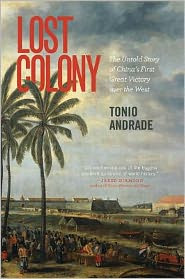 He applied the “Page 99 Test” to his new book, Lost Colony: The Untold Story of China's First Great Victory over the West, and reported the following:
He applied the “Page 99 Test” to his new book, Lost Colony: The Untold Story of China's First Great Victory over the West, and reported the following:On p. 99 of Lost Colony, the Chinese protagonist of the book, the dread Koxinga, is trying to persuade his generals to attack the Dutch and capture the island of Taiwan. Born to a Chinese pirate and raised by a Japanese samurai clan, Koxinga has raised one of the largest armies in the world and is devoting his life to trying to unify China. On p. 99 he tells his generals that the Dutch red-haired barbarians should be easy to drive away from Taiwan. His generals object. He overrules them. His massive fleet sails to Taiwan.Learn more about Lost Colony at the Princeton University Press website.
The war that ensued was hard-fought and brutal. It was also the first war between Chinese and western European forces, and the most important Sino-Western conflict until the famous Opium War of the nineteenth century. We know a great deal about the Opium War, of course, but this is the first book about the Sino-Dutch War, and it has important lessons about one of the most important questions in world history, to wit, why did Europeans rather than other Eurasians become so powerful on the world stage in modern times (i.e., after around 1500)? Asians – most notably the Chinese – had been world leaders in science and technology for millennia. What accounted for the sudden leap in European power in recent centuries?
Historians and sociologists have been vehemently debating this question. On one side are the revisionists, a group of historians and sociologists who believe that the most developed societies of Asia were progressing along paths similar to Western Europe. They argue that the divergence between Europe and Asia came late (i.e. around 1800), when industrialization and its concomitant economic revolutions changed the game. This is a radical challenge to established views, and it has been hotly contested by a group of scholars known as the neo-traditionalists, who argue that Europe’s lead over Asia began by the 1500s at the latest.
The debate has been intense and rather unproductive, but this war gives us an opportunity to directly gage the effectiveness of European and Chinese military technology. After reading through the wonderful sources I was forced to conclude that although the revisionists are right on many counts, the Dutch did have a slight but important advantage in nautical technology and in fortification techniques. Still, we must accept that China was far from stagnant in the 1500s and 1600s and 1700s. Many processes were occurring that were quite similar to the modernizing trends that were altering Europe. Was Europe in some ways evolving faster? It seems likely, but we still know astonishingly little about Asian history.
One of the most fascinating things I learned was the depth and brilliance of China’s military tradition. Once, in a college Chinese class, I was shown a newsreel from the 1940s in which the narrator said, in a theatrical voice, “The Chinese are a peaceful people, who have never started a war of aggression in their history.” Of course I knew even then that that was silly, but this view of Chinese as a pacific people is still extant. A small but growing group of scholars is studying China’s military history and turning up some fascinating findings. My book is part of this exciting trend. Indeed, I believe that Koxinga won his war against the Dutch thanks in part to China’s rich and effective military tradition, and since that tradition still deeply informs China’s current leaders, we can learn important lessons about the China of today by studying Holland’s Lost Colony and the warriors who captured it.
--Marshal Zeringue



